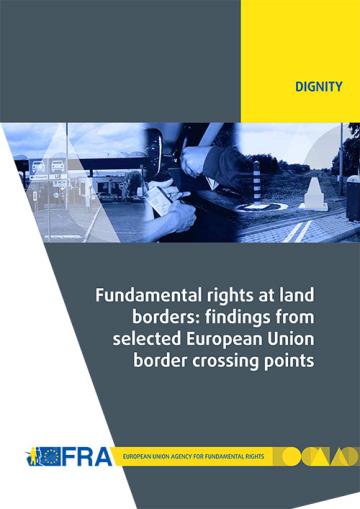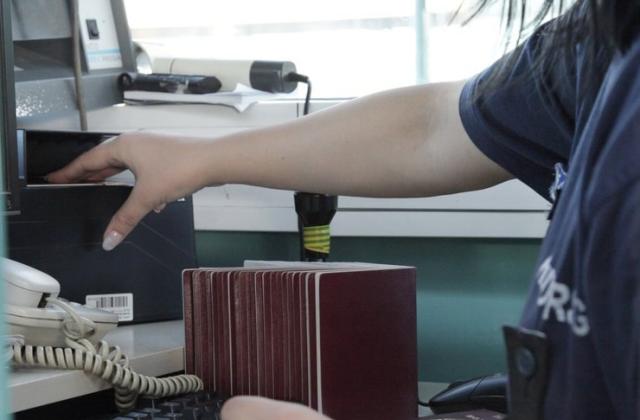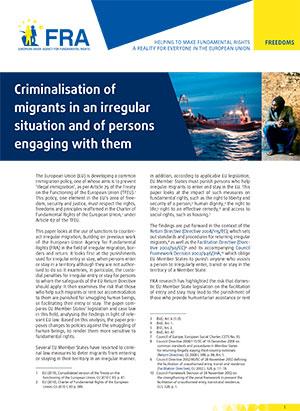Help us make the FRA website better for you!
Take part in a one-to-one session and help us improve the FRA website. It will take about 30 minutes of your time.

Fundamental rights at Europe’s southern sea borders
By mapping the fundamental rights challenges at Europe’s southern sea borders and identifying promising practices, this report is intended to offer advice to EU policy makers and practitioners at both the EU and Member State level. With its findings, the report highlights the following concrete measures, among others, that the EU and its Member States can take to address specific shortcomings identified by this research.
- Right to life (see Chapter 2)
- Interception and non-refoulement (see Chapter 3)
- Maritime surveillance systems and fundamental rights (see Chapter 4)
- Immediate humanitarian response upon arrival (see Chapter 6)
- Fair screening and identification procedures (see Chapter 7)
- Fundamental rights in the context of return and readmission (see Chapter 8)
- Fundamental rights training for border guards (see Chapter 9)
- EU solidarity and Frontex: fundamental rights challenges (see Chapter 10)
The right to life is one of the most fundamental of human rights. It is enshrined in Article 2 of the EU Charter of Fundamental Rights and in Article 2 of the European Convention on Human Rights (ECHR). In the maritime context, it has been codified by the duty to render assistance to persons in distress at sea and by search and rescue obligations.
- When the EU and its Member States provide assets, equipment and other maritime border management facilities to neighbouring third countries, priority should be given to assets and equipment that can be used to enhance their search and rescue capacities.
- EU Member States should not punish for facilitation of irregular entry any private shipmaster who takes on board or provides other assistance to migrants in unseaworthy and overcrowded boats. The European Commission could consider stipulating this in a possible future review of the Facilitation Directive.
- EU Member States should use pilot projects to explore ways to support private vessels, and in particular fishing vessels, when they face economic loss because they are involved in rescue operations.
For more information see Chapter 2, pp. 29-38.
Interception and non-refoulement
Many fundamental rights challenges emerge in the context of border surveillance at sea. Border management authorities have practical obligations to safeguard core fundamental rights, such as the right to life, the principle of non-refoulement as well as the need to treat persons rescued or intercepted at sea in a dignified manner.
- After the annulment of Council Decision 252/2010/EU, the EU legislator should adopt clear guidance on the respect for fundamental rights in the context of maritime surveillance and on the disembarkation of persons intercepted or rescued at sea, including in particular as regards the principle of non-refoulement. Such guidance should be applicable not only to Frontex coordinated operations, but also to those operations EU Member States carry out.
- Until international law of the sea or EU law provide further legal clarity on where to disembark intercepted or rescued migrants, all parties should make practical arrangements to allow for swift resolution of any disputed case in full respect of the principle of non-refoulement. Creative opportunities for joint action among all parties involved, including the idea of joint processing of asylum claims should be explored in this regard.
- Where the EU or its Member States finance or donate maritime assets and equipment to third countries, they should also provide training to the authorities of the receiving country to underscore the proper use of donated assets and equipment in accordance with applicable human rights law. Donors should monitor how third countries use the assets and equipment they provide and discuss any inappropriate use at bilateral meetings, training or through other channels.
- Schengen evaluations on the surveillance of maritime borders should also review as part of their assessment whether instructions and training provided to officers patrolling the sea adequately address fundamental rights and in particular the prohibition to return a person to persecution, torture or other serious harm (principle of non-refoulement) – including when patrols are carried out jointly with third countries. To this end, evaluators should be provided with appropriate guidance and training on fundamental rights.
For more information see Chapter 3, pp. 39-53.
Maritime surveillance systems and fundamental rights
In the field of border management, EU Member States and Schengen-associated countries are establishing Eurosur as a platform for exchanging border management information between themselves and with Frontex. Given the close link between rescue at sea and maritime surveillance, the planned Eurosur system’s life-saving potential should be put to best use, as it is likely to provide information on vessels or persons threatened by grave and imminent danger requiring immediate assistance.
- The European Commission should thoroughly assess the fundamental rights implications and risks prior to establishing a Common Information Sharing Environment (CISE) and provide for a system to regularly evaluate CISE’s impact on fundamental rights and in particular on the protection of personal data.
- The EU legislator should support Eurosur’s lifesaving potential by strengthening the references to rescue at sea in the proposed regulation. The Eurosur handbook should include practical guidance on how to achieve this. The handbook could recommend, for example, that one national authority manages its respective Eurosur and national rescue coordination centres, that rescue coordination centres post liaison officers in the national Eurosur centre and the creation of an automatic alert system.
- Monitoring Eurosur technical and operational functions should be complemented by monitoring its impact on fundamental rights. In the proposed regulation or in the Eurosur handbook, an explicit provision should be made for an independent actor with fundamental rights expertise to support the monitoring work Frontex is requested to undertake.
- The Eurosur handbook should provide persons operating national coordination centres with clear guidance on how to ensure respect for fundamental rights, including on how to avoid personal data from being inadvertently collected, stored and shared, as well as how to reduce the risk that data referred to in Article 18 (2) of the proposed regulation are shared with third countries.
For more information see Chapter 4, pp. 55-64.
Immediate humanitarian response upon arrival
Migrants arriving by sea are usually in need of emergency humanitarian assistance, specifically food, water, warm clothing, medical care and a place to rest. Greece, Italy, Malta and Spain have established different systems to cater for the needs of migrants when they are disem- barked at the pier. Some are more comprehensive and involve specialised humanitarian non-governmental organisations (NGOs), whereas others do not.
- As a good practice, EU Member States should collaborate with specialised international organisations and/or humanitarian NGOs during the disembarkation phase to provide medical and other emergency aid as soon as possible upon arrival at the pier.
- In order to ensure an early identification of persons in need of urgent medical treatment, a doctor or qualified nurse should see each migrant individually at the moment of disembarkation.
- Facilities used to host migrants immediately upon arrival should be equipped to provide adequate care and protection to separated children, families as well as individuals with specific needs, such as survivors of torture or suspected victims of human trafficking. EU Member States should consider operating open facilities when there is no risk of absconding or other reasons justifying a deprivation of liberty, or where protection considerations should prevail, as is the case, for example, for separated children.
- Procedures and conditions in closed facilities used for the initial reception of newly arrived migrants should be regularly reviewed by independent detention monitoring bodies – even if these facilities are used only for a very short time after the arrival of a migrant – and the relevant authorities should implement their recommendations. Civil society organisations offering social and legal support as well as international organisations mandated to work with asylum seekers and/or migrants should be given regular access to the held persons.
- EU Member States should make all reasonable efforts to avoid a prolonged stay of migrants in initial reception facilities, particularly where these are not equipped for longer stays. Separated children, survivors of torture and suspected victims of human trafficking should be moved without delay to appropriate facilities.
For more information see Chapter 6, pp. 71-86.
Fair screening and identification procedures
To respect the principle of non-refoulement and to ensure that adequate protection and care is given to those persons who are entitled to it, mechanisms must be in place at the border which make it possible to identify and channel individuals to appropriate procedures.
- EU Member States should undertake regular independent reviews of the effectiveness of systems to provide information to newly arrived migrants. As a good practice, NGOs and international organisations should be involved in the provision of information to newly arrived migrants.
- Effective mechanisms must be in place to identify international protection needs at borders. These include: ensuring that every official who may be in contact with migrants is instructed to forward asylum applications to the competent national asylum authority; enabling individuals to lodge an asylum application at any time; and phrasing questions during the identification interview in such a way as to make it possible to learn whether a person may be seeking international protection.
- Delays in the identification of separated children and referral as well as transfer to appropriate reception structures should be reduced by applying swifter procedures. At arrival point, trained staff should be present who can provide information to children in a child-friendly manner.
- Mechanisms to identify potential victims of human trafficking at borders should be regularly reviewed involving actors with anti-trafficking expertise. They should be enhanced, building on lessons learned and also on promising practices identified in this report.
- Procedures should be put in place at points of arrival to facilitate the identification of survivors of torture and victims of other serious crime and their referral to appropriate structures which can provide the necessary legal, medical and psycho-social support either in the host country or elsewhere as may be appropriate in each particular case, taking into account the specific situation of the victim.
For more information see Chapter 7, pp. 87-96.
Fundamental rights in the context of return and readmission
From a fundamental rights point of view, readmission agreements bring both opportunities and risks. On the one hand, an agreement can facilitate the return of third-country nationals to their home country, thus reducing the risk of protracted immigration detention and protracted irregular stay. Readmission agreements with transit countries can also be used to facilitate voluntary departures for migrants in an irregular situation who wish to return home, but who may not have the necessary papers to transit through a third country. In this way, the agreements would reduce the need for forced removals. On the other hand, the agreements raise a number of challenges, particularly when third-country nationals are returned to a transit country other than their home country.
- The fundamental rights safeguards suggested by the European Commission in its 2011 evaluation report on existing EU readmission agreements should be included in new EU readmission agreements. EU Member States should also seriously consider such safeguards when they negotiate readmission agreements.
- Where EU Member States have set up procedures for the immediate return of newly arrived migrants, all officers involved should receive clear instructions and training on the fundamental rights safeguards that need to be respected during the process.
- The EU and its Member States should not conclude readmission agreements that cover citizens of a third country with states that have a record of persistent and serious human rights violations. Where agreements are nevertheless put in place by EU Member States, these should contain concrete guarantees that the readmitting country respects the returnees’ human rights. The agreement should also establish an effective and independent monitoring mechanism.
- Information on whether an individual applied for asylum should not be passed on to the readmitting state. Passing on such information would contradict the spirit of the confidentiality requirement set forth in Article 41 of the Asylum Procedures Directive.
For more information see Chapter 8, pp. 97-103.
Fundamental rights training for border guards
To approximate national training of border guards, Frontex has developed a Common Core Curriculum. This curriculum which was adopted first in 2003 and revised most recently in 2012 includes a set of fundamental rights knowledge and skills that every border guard should have. Pursuant to Article 5 of the revised Frontex Regulation (EU) No. 1168/2011, EU Member States have a duty to integrate the curriculum in their national training for border guards.
- All national institutions involved in maritime border surveillance should incorporate the relevant fundamental rights subjects of the Common Core Curriculum in their basic training.
- As a general rule, national training institutions as well as Frontex should incorporate human rights into the training materials dealing with the different aspects of maritime border surveillance operations, rather than teaching it as a stand-alone issue.
- Frontex is encouraged to promote actively their training manuals on trafficking in human beings as well as on fundamental rights, which were developed in collaboration with international organisations and the FRA, including through targeted training activities for EU Member State representatives. National training institutions should make full use of the training manuals on fundamental rights for border guards developed by Frontex in collaboration with the FRA and other international organisations, as well as of the UNHCR training manual for border guards.
For more information see Chapter 9, pp. 105-110.
EU solidarity and Frontex: fundamental rights challenges
The EU has established some solidarity measures to support EU Member States most affected by arrivals. These include EU funding, which is currently being revisited with the proposal to create two new funds: the Asylum and Migration Fund and the Internal Security Fund (in particular its instrument on borders and visas). Another solidarity tool is Frontex operational support. Considerable resources are devoted to Frontex-coordinated operations at sea.
- As regards future home affairs funds, practical steps should be taken to ensure that all EU measures to be funded under the Internal Security Fund instrument for borders and visa and the Asylum and Migration Fund are compatible with fundamental rights. This could be done by ensuring that independent fundamental rights expertise is sought at key stages of programming, project implementation and evaluation. Moreover, express reference to fundamental rights should be made in the operative part of the proposed Internal Security Fund instrument for borders and visa.
- Concerning Frontex-coordinated sea operations, operational plans should continue to reflect the content of the guidance included in Council Decision 2010/252/EC, until it is replaced by a new instrument. Evaluation reports of Frontex operations should also discuss the challenges, incidents and promising practices related to fundamental rights in an operation.
- Frontex operational plans should contain clear instructions and procedures for debriefing officers on referring, with the interviewee’s consent, asylum requests as well as other important protection-relevant information received during
the debriefing interview to the national asylum or other competent authority. If present in the operational area, EASO should provide training and guidance to debriefing officers to enable them to recognise asylum requests and to refer these to the appropriate authority. - EU Member States hosting Frontex-coordinated operations should ensure that practical guidance on the fundamental rights issues related to a specific operation is provided to guest officers, and, where possible, involve the international organisations, humanitarian or other actors dealing with the relevant fundamental rights issue at a Member State level. Frontex should encourage this guidance and involvement.
- The European Patrol Network is encouraged to regularly discuss the fundamental rights challenges relating to maritime surveillance and to promote good practices in this regard.
For more information see Chapter 10, pp. 111-124.











